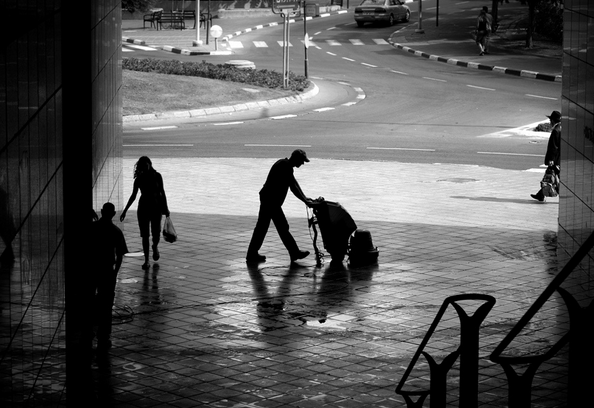The Humbler Realms, Part 2

My last post about the contributions of humble people seems to have struck a chord. People are writing to tell me about the “Charlie’s” in their lives, the people who unostentatiously contribute to their places and communities. One woman wrote,"He is a man much like Charlie. He takes in the stray cats and loves them like family, brings his neighbors fruits and vegetables from his garden, makes homemade pickles and dried apples and sends them to his grandchildren, much to their delight. He visits loved ones in the hospital regularly and knows everyone in his very small town by name. He always offer a big hello and smile to everyone and, if they're willing to lend and ear, he'll tell a story or a clean joke or two. This is why, when you go about his day with him, everyone waves and smiles at him and knows his name, Colonel Wylie, or just Ed."
Another woman, Laurie, who cares for her special-needs son, said,
"I have been feeling a bit overwhelmed by the bigness of so many of the conversations that go on in your realm, and around you. Not because I can't grasp them or don't think they're important, but because there are pressing needs in my day-to-day life that are very basic right now. I'm not in a position to engage in large scale activism or extended discussions online, so I see most things through the lens of healing on the personal level.... thank you for writing this. It honors the small and humble work that so many of my friends with struggling kids do every day."
Someone else, a municipal employee, wrote, “It seems that daily I struggle with wanting to be 'important' and accomplish great things, yet have a very local and humble existence.”
Inevitably, most of us are in this boat. Not everyone can do something that is “bigger” than what most other people are doing. If we are to validate the contributions of the vast majority of people, the Charlie’s and Ed’s of the world, we must let go of the metrics of bigness and importance we have inherited. This is especially true if we want to validate the kind of work traditionally done by women – the up-close-and-personal caring and nurturing of others.
My friend Bayo Akomolafe replied to my post as follows:
“It's hard not to define importance by how many people pay attention, but maybe if we did away with the idea that the world is inert and dormant until animated by an observer (the media, a large audience, an authority figure, God), we would be released to more fantastic realms of intra-service...we might find that things get more important, more real, more authentic, when they get smaller.”
A few days before the Greek referendum I interviewed a woman from Athens who said that the people who intend to vote “yes” are generally doing so out of fear. They fear the unknown and are susceptible to scare tactics about what might happen if they vote “no”. The same was the case in the Scottish referendum for independence. From what (admittedly, pro-independence) Scots have told me, the anti-independence narrative was almost entirely fear-based, and the most significant fear, underlying all the “what-ifs,” was simply the fear of defying authority. For that matter, one might say that American foreign policy (not to mention economic policy, prison policy, immigration policy, etc.) is also driven by fear, obsessed as it is with security, surveillance, border protection, and “America’s adversaries.” Globally, it is fear that keeps the system running (some might say it is greed, but greed is actually a symptom of fear too, the fear of not being in control and not having enough). Fear keeps the elites running the whole game according to their rules, and fear keeps the oppressed from challenging them.
That is why I am sure that people like Ed, Charlie, and Laurie are doing important political work. First, they are reducing the level of ambient fear and alienation that is the engine of the world-destroying machine. The idea of an uncaring world full of scary people seems a little less compelling when I’m in the presence of a truly kind person. Secondly, the people of these humble realms are the ones that provide emotional, spiritual, and material nourishment for those whose calling does take them to the public realm. While there may be lone heroes who valiantly resist oppression without support, such heroism often takes a perverse turn when it is disconnected from a web of compassionate, intimate relationships. Many of the most violent people on earth consider themselves heroes: Dylann Roof, Anders Breivik, Islamic State executioners, Predator drone operators, and so on. The image comes to mind of the hard, ascetic revolutionary, steeling himself to override his humanity for the sake of the cause – for the greater good, as the evil wizard Grindelwald put it in Harry Potter.
Positive change does not originate in the most visible heroes. As the more honest of them acknowledge, they are the channels or embodiments of a much greater collectivity. All contributions to this collectivity are necessary. You may not know how your hours of caring for that child, stretching your patience nearly to breaking, uncelebrated and invisible, are contributing to the healing of our world, but they are.
